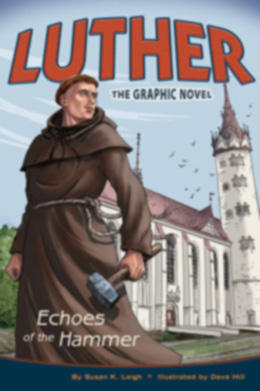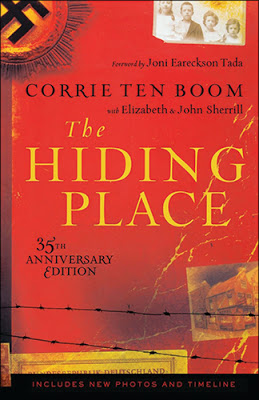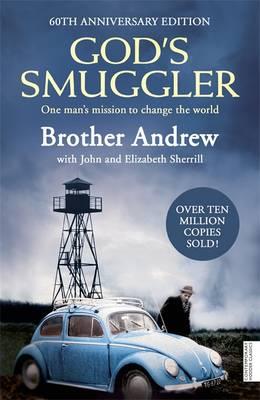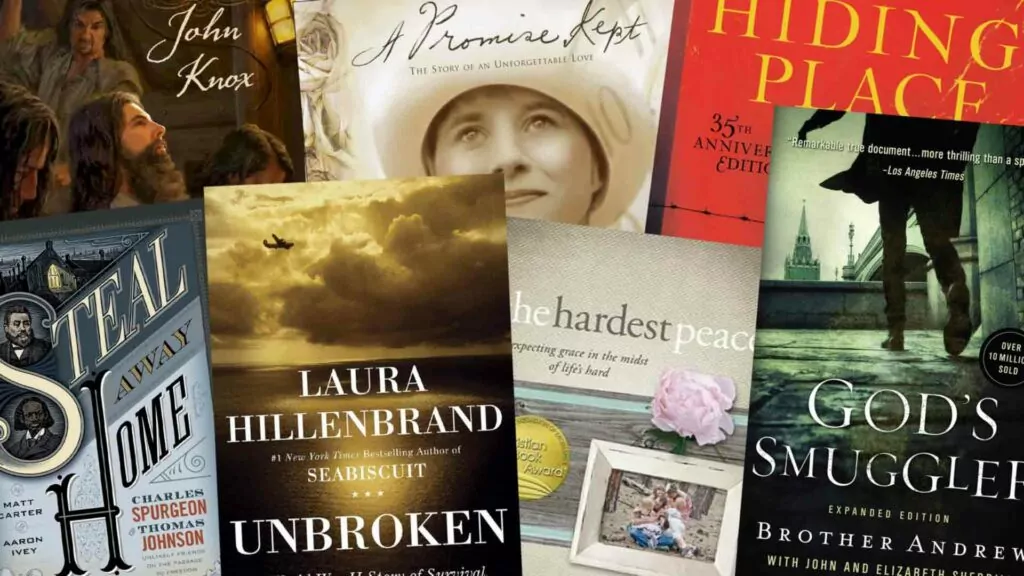A reason to read Christian biographies is to see and be encouraged by what God has done in other people’s lives. They’re a way to learn about how God acts in the world around us. There’s also a challenge that comes with true stories of Christians who have gone before us – when you see how God used them, you have to ask yourself, “What could He do with me, if only I trusted Him to keep hold of me?”
The reviews are divided into 2 sets of 5. In every case, you can find a longer review of the book by clicking on its title.
5 to get you (or your kids) started
 This first set is for everyone who hasn’t gotten into biographies yet. These are especially accessible, sometimes because they are shorter reads, and others because they are fictionalized biographies that read like novels because, well, they are novels… but grounded firmly in reality.
This first set is for everyone who hasn’t gotten into biographies yet. These are especially accessible, sometimes because they are shorter reads, and others because they are fictionalized biographies that read like novels because, well, they are novels… but grounded firmly in reality.
1. Luther: Echoes of the Hammer
by Susan K. Leigh
Graphic novel, yes; superficial? No!
2. When Faith Is Forbidden
by Todd Nettleton
40 true stories from the front lines about God using miracles and persecution to gather His people.
 3. The Vow
3. The Vow
by Kim and Krickitt Carpenter
After a car accident leaves a wife with no memory of even meeting, let alone marrying, her husband she remains committed to the marriage vow she made before God.
4. A Promise Kept
by Robertson McQuilkin
Short account of a Christian college president who leaves his influential position when his wife is struck by Alzheimer’s because that’s what love is.
5. Steal Away Home
by Matt Carter and Aaron Ivey
A fictionalized biography of Charles Spurgeon and his friend, a former slave, Thomas Johnson – a pain-free way to learn about the “Prince of Preachers.”
Bonus: Douglas Bond’s The Thunder – A fictionalized biography of John Knox, the man and the legend, a bodyguard, galley slave, and a pastor to queens, including one who really didn’t like him.
5 for those who already love biographies
 This second set is for those who already appreciate biographies. And while I’ll readily concede that tastes differ, the top three titles here should be included in anyone and everyone’s Top 10 biographies list – these are fantastic books!
This second set is for those who already appreciate biographies. And while I’ll readily concede that tastes differ, the top three titles here should be included in anyone and everyone’s Top 10 biographies list – these are fantastic books!
1. Unbroken
by Laura Hillenbrand
WWII veteran Louis Zamperini survived enemy fire, being alone on a raft for weeks, and a Japanese POW camp, all the while being “unbroken.” But Who was keeping him so?
2. God’s Smuggler
by Brother Andrew
Dutchman dares to smuggle Bibles behind the Iron Curtain, counting on God to make seeing eyes blind.
3. The Hiding Place
by Corrie ten Boom
Dutch woman and her family hide Jews during WWII, get caught and are sent to concentration camps, and Corrie shares us how God was with her in it all.
 4. The Hardest Peace
4. The Hardest Peace
by Kara Tippetts
A pastor’s wife starts a mommy blog, then uses it to share her journey when she is diagnosed with terminal cancer. She shows us how to die in the security, and to the glory, of God. Amazingly beautiful!
5. Man of the First Hour
by George van Popta
For anyone with Canadian Reformed denominational connections, this is a must-read. The story of the first pastor of the Canadian Reformed churches, and is as much a history of him and his family as of the founding of the denomination.
Bonus: Rosario Champagne Butterfield’s The Secret Thoughts of an Unlikely Convert – Lesbian university professor meets a pastor who asks her, have you considered you might be wrong?
You can find even more great biography recommendations by clicking here.













